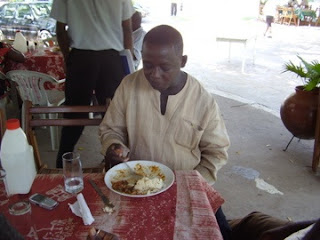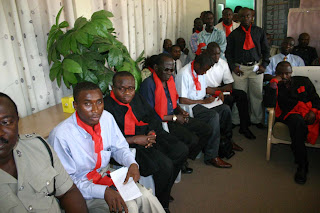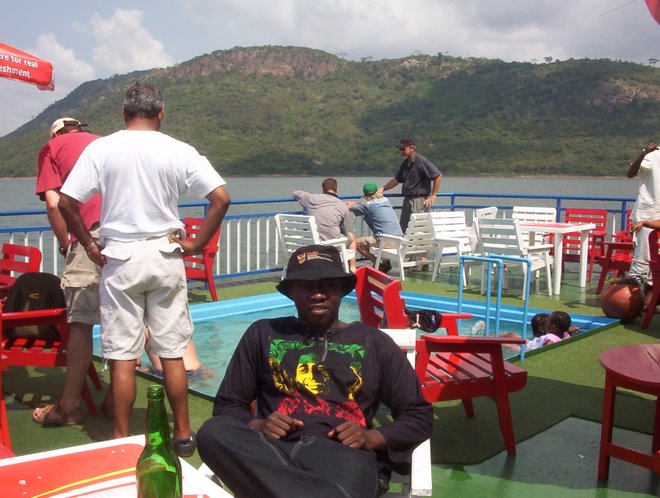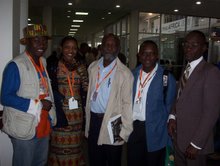Abuakwa formulation plant
Workers of the Abuakwa Formulation Plant Limited in Kumasi, packagers of confidor, a chemical used in the mass cocoa spraying exercise, have appealed to the government to intervene and cause the institution of proper investigations into the operations of the company before allowing it to be closed down.
According to the workers, the government should further intervene and suspend a proposed signing of a final termination of a joint-venture agreement on February 28, 2007 between the Cocobod and Bayer Crop Science, a German company which manages the formulation plant.
This, they said, would help forestall the immediate closure of the formulation plant for proper procedures to be followed.
Bayer Crop Science Limited from Germany currently holds 51percent shares in the Abuakwa Formulation Plant while the Cocobod holds the remaining 49 percent shares.
According to the workers, they had information that there had been a decision to close down the plant for another company, Wienco Limited, to bring in finished products from abroad for the mass spraying exercise to which they were yet to be officially informed eventhough there had been a decision to sign a final termination of the joint-venture agreement on February 28, 2007.
In a statement signed by Mr Charles K. Boateng and Mr John Ayisih-Henaku, Union and Senior Staff Association Chairmen respectively, the workers stated that they felt that the transaction was being schemed to favour Wienco, which used to be an agent for Bayer Crop Science in the importation of confidor.
Bayer as managers of the formulation plant used Wienco as an agent in the importation of confidor in 200 litre drums, which the plant in turn refilled into one litre bottles through controlled machines in controlled and restricted environment.
The workers said they felt there was a ploy to eventually eliminate the formulation plant so as to enable Wienco to bring in finished products so as to maximise profits and even added that Wienco had even started importing the finished products in one litre bottles.
They indicated that when this was allowed to go on, it would defeat government’s drive to create employment particularly in the rural areas.
The workers stated that although they were yet to be informed officially about the happenings, they had information that the Environmental Protection Agency (EPA) has written a report that the plant had been highly contaminated and needed to be closed down.
“We vehemently protest the report of the (EPA) with the reasons that the first time we saw an EPA official at the plant was somewhere in December last year, when the official who was on his way to Sunyani, passed through the plant and indicated that Cocobod had approached their outfit to conduct a future environmental assessment of the plant.
“We even asked him when they were to come to the plant to conduct the test and he said emphatically that Cocobod was yet to provide them with the things to look out for so he would come later when directed to do so”, the workers stated.
They emphasised that the said EPA report was hollow and porous as there had not been any formal test conducted at the plant.
“What were the parameters considered? We the host were not shown any letter from Cocobod. Neither have we received any instruction from neither Cocobod or EPA on this matter. Again they never took samples or measurements from the plant as normal test are conducted”, they said.
The workers said neither the Cocobod nor Bayer Crop Science had officially informed the workers of the intention to close down the place and that the only time Cocobod officially wrote to the plant was on a request for information on the list of staff, their designations and their date of employment.
They said a decision by Bayer Crop Science to remove some machines from the plant to Germany to ostensibly de-contaminate them was a ploy to kill the plant totally.
Again, the workers questioned why the buildings were to be decontaminated here in Ghana with some of the machinery while certain vital portions of the machines are to be sent to Germany for decontamination.
They said the machines were in a better position to formulate, fill and package any liquid insecticide and herbicides so removal of any part of the machines would render the rest incapable of sustaining the functions of formulating - filling and packaging.
According to the workers, the whole plant machinery constitute an asset to attract future investors so removal of any part would defeat that basic principle.
They said the agent, Wienco and Bayer are familiar with the operations of the of plant and know that the removal of any vital machines here would strengthen its resolve to bring in already filled and packaged finished products which Wienco is already importing from a sister company of Bayer.
“We feel that the removal of the vital machines to Germany to decontaminate was a ploy by Bayer to offer employment to one of its factories, which is already formulating the confidor in Europe”.
They said the Cocobod had absolute right and authority to change the product (confidor) at its convenience in the light of the demise of the joint venture agreement between it and Bayer as it would be more convenient for the Cocobod to invite investors while the plant was still working.
The workers called on the management of the Cocobod not to hastily sign the already prepared termination agreement but investigate further before taking a decision.
They said if Bayer and Cocobod agree with the EPA that the plant was really heavily contaminated then the staff were equally worried about their health since they had been working there since 1988, eating and spending eight hours daily there.
They then insisted that the staff should therefore be equally sent to overseas for thorough tests and subsequent treatment.
When contacted, the General Manager of the Abuakwa Formulation Plant, Mr Charles Boakye corroborated the story of the workers and said he was equally worried about the development.
He said as a General Manager of the plant, he had been sidelined in many of the dealings of the plant and even wondered why Bayer decided to use Wienco as an agent in the importation of the product.

















































